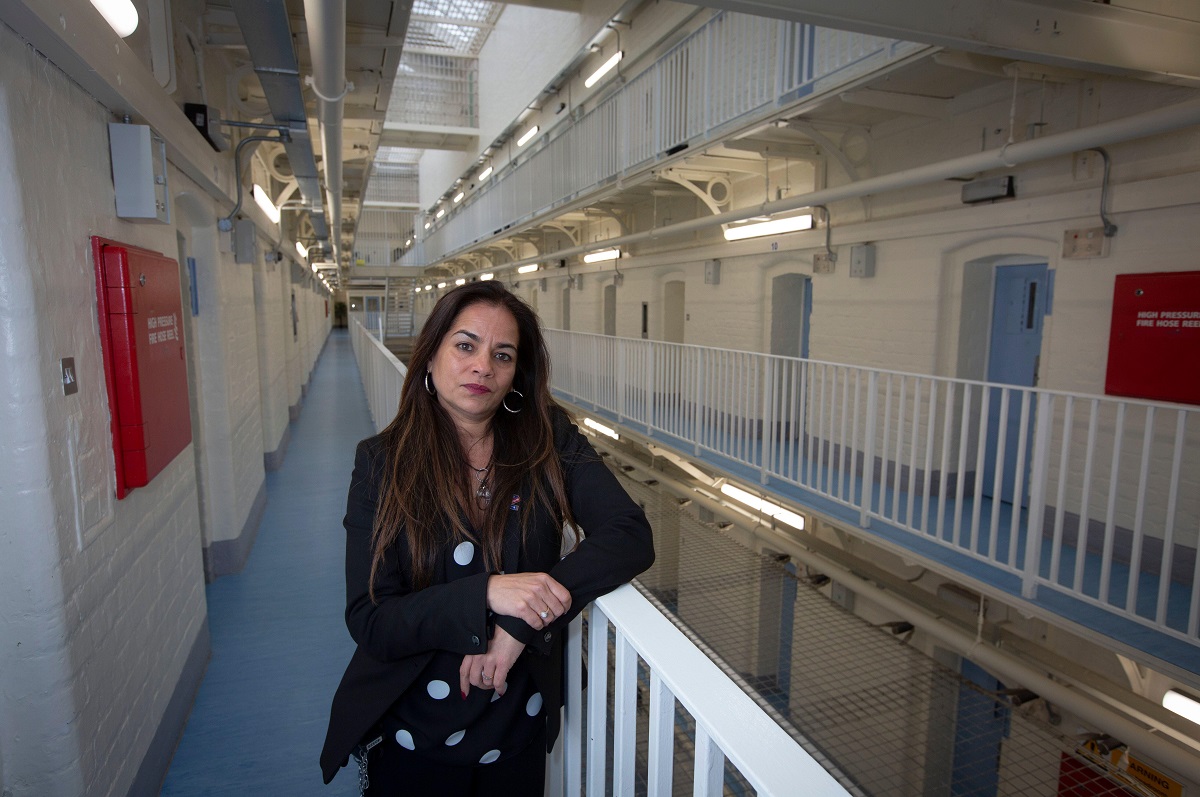Staff at Warrington prison failed to properly raise alarm after inmate's door blocked
John Singleton had a history of self harm but prison officers failed to sound the alarm promptly when he barricaded himself into his room and wouldn’t respond to calls. The 46 year old’s death is one of three that reveal a concerning pattern at HMP Risley.
Staff at a prison where soaring self-harm rates have been branded “stubbornly high” failed to properly raise the alarm after finding a suicidal inmate’s room blockaded, an investigation has found.
Although an officer at Warrington’s medium-security HMP Risley thought he could hear John Singleton “sniffing and shuffling about”, he couldn’t see through the cell’s observation panel because it had been stuffed with toilet paper and a bed had been propped against the door as a barricade.
Singleton, whose mental health was known to have effectively collapsed, also failed to respond to the officer’s calls.
But rather than immediately radioing for urgent help, the worker – named in documents only as Officer A – left the cell and went to a wing office to call an orderly officer, who was already dealing with another suicidal prisoner.
By the time officers finally got inside Singleton’s cell 19 minutes later, he was found hanging. He was cut down and taken to hospital but found to be brain dead. He died 10 days later.
“We cannot say if this delay affected the outcome for Mr Singleton, although we do know that any delay may be critical in a medical emergency,” said the Prisons and Probation Ombudsman.
The attempted burglar’s death is one of at least three in recent years to spark concerns at the more than 1,000-capacity facility for adult men, analysis of prison investigation records by The Warrington Lead shows.
Another prisoner, 23-year-old Bradley Charnley, who had a history of self-harm, didn’t have his mental health monitored in the weeks before he was found hanged in his cell, while a control room worker failed to call an ambulance for “five to six minutes” after an emergency code was called.
And Paul Degg, 46, had his hourly observations cut from once an hour to once every two hours without the input of mental health professionals just days before he was found hanged in his cell. The officer who found him also failed to call a medical emergency code.
After being shown The Warrington Lead’s “distressing” findings, Andy Bell, chief executive of the Centre For Mental Health, an independent UK charity, said: “Every suicide death in prison is one too many.
“Our research shows that prisoners face very high risks of self-harm and suicide, and staff shortages, overcrowding and a lack of psychological support in prison can all heighten risks.
“It's imperative that every prison strives to become a trauma-informed environment that puts safety and wellbeing first, with adequate levels of training and staffing.”
Pia Sinha, who has governed at Risley and is chief executive of the Prison Reform Trust, said: “People with poor and sometimes acute mental health problems continue to drift into custody with tragic consequences. Rather than offer support, being locked up in a prison environment exacerbates mental health conditions.
“Prison staff are not mental health professionals and although lessons urgently need to be learned, the bigger issue is about providing appropriate avenues for diverting people into mental health treatment rather than criminalising them.”
An inspection at Risley last April flagged a “range of serious issues”, the HM Inspectorate of Prisons (HMIP) said.
A follow-up visit in January found that “care for those at risk of self-harm had improved”, with “more dedicated safer custody staff” and “much-improved use of data to understand the drivers of self-harm”.
“However, rates of self-harm remained stubbornly high and, while the number of listeners (prisoners trained by the Samaritans to provide confidential emotional support to fellow prisoners) had increased, there were still not enough of them in much of the prison,” HMIP’s report said.
A Prison Service spokesperson said: “Our thoughts remain with the friends and family of Paul Degg, John Singleton and Bradley Charnley.
“HMP Risley has already acted on the ombudsman’s recommendations, including renewed training for staff so they are better able to spot and support those with poor mental health, with HMIP acknowledging the progress the prison has made.”
At the full inspection last year, self-harm rates were higher at Risley – where about 20% of prisoners were foreign and the same number from a black or ethnic minority background – than other category C prisons, with 630 incidents in a 12-month period, including a “persistent number of serious” ones. Around a third of the prison’s population was being supported by the psychosocial team.
Despite efforts to address the problem, self-harm rates had rocketed even higher by the time inspectors visited again earlier this year.
Inspectors did say, however, the prison has made “reasonable progress”, with an action plan drawn up and bosses “taking a more active and analytical approach to understand and addressing self-harm”.
“Clear messages” emerged after a survey of almost 300 prisoners, “including the negative impact of debt and boredom on self-harm, especially for those without” jobs.
Some practical measures were then “quickly implemented”, with extra items given to prisoners on the night of arrival to reduce the risk of debt, as was a small midweek phone credit to all prisoners, allowing them to contact their families regardless of their financial circumstances.
New suicide and self-harm training has been given to all staff at Risley and a new prisoner safety boss has been hired there, it is understood.
The prison has 24-hour healthcare cover, with the Greater Manchester West Mental Health Foundation Trust (GMMH) responsible for mental health services since 2015.

Pia Sinha
Sandeep Mathews, the trust’s associate medical director, said: “We are sorry for the sad deaths of three prisoners at HMP Risley; our thoughts remain with the families of those who died.
“Over the last two years we have seen a significant increase in the resources that have been made available to provide mental health care within HMP Risley. This means we have been able to redesign our model to deliver a service that is broadly comparable to what is delivered in the community.
“The team works closely in partnership with the prison and other stakeholders. We have introduced a weekly, prison-led, multi-agency senior leaders’ meeting to discuss prisoners who require additional support, a weekly dual diagnosis meeting which has improved partnership working between the mental health and substance misuse services and a monthly training programme delivered by the mental health team to prison officers.
“Prisoners identified as being at risk are managed via the national assessment, care in custody (ACCT) process, which is a prison-led, multi-agency meeting.
“GMMH’s mental health team attends all ACCT reviews for prisoners with an identified mental health need to help safeguard vulnerable prisoners.”
A history of self harm
Paul Degg, 46, who was serving 32 months in prison for wounding with intent, was found hanged in his cell. He had significant mental health issues, including a history of self-harm, and been managed under prison service suicide and self-harm prevention procedures – known as ACCT – six times at Risley.
An investigation into Degg’s death revealed that, four days before, his risk was deemed to be low and the frequency of his observations was cut from once an hour to once every two hours without input from the mental health team.
Degg was last seen alive at 5.15pm on September 29 2018, when he was eating dinner and watching TV. Some 90 minutes later he was found hanged.
A prison officer failed to call a medical emergency code and, although investigators ruled “this did not cause a delay in the emergency response or affect the eventual outcome for Mr Degg, it could be crucial in future incidents”.
Ombudsman Sue McAllister said in a report: “I am concerned that staff at Risley are not following the correct medical emergency procedures, an issue we have raised before.”
An inquest in April 2024 concluded: “Mr Paul Degg died as a result of a self-applied ligature. His intention at the time of the act cannot be determined”.
In response to Degg’s death and the subsequent probe, Risley accepted a number of recommendations, including that there should be a “multi-disciplinary approach for all case reviews with relevant healthcare staff and other key workers providing detailed input if they are unable to attend”.
Increasingly paranoid behaviour
John Singleton, 42, who was serving a 10-month sentence for attempted burglary, was found hanging in his cell. The day before, prison officers had started ACCT because they were worried about his increasingly paranoid behaviour, which included Singleton, who was on antidepressants, isolating himself because he feared being attacked by fellow prisoners.
Despite a prison officer finding Singleton’s cell observation panel blocked by toilet paper and his door barricaded by his bed – and getting no response to calls – the officer did not call for urgent help on his radio. Instead, he went to the wing’s office to call the orderly officer, who was dealing with another incident.
Staff did not get inside Singleton’s cell on 1 September 2019 until “more than 14 minutes later”. It was actually 19 minutes.
Ombudsman Sue McAllister said: “While I cannot say for certain that a quicker response would have changed the outcome for Mr Singleton, we know that in a medical emergency, a delay of a few minutes may be critical.”
Paramedics revived Singleton and took him to hospital, where he never woke up before dying on 10 September 2019. An inquest in November 2023 concluded that Singleton died from suicide.
Risley accepted a number of recommendations from the Prisons and Probation Ombudsman, including that ACCT observations should be carried out at unpredictable times and that a protocol should be produced to “instruct staff on what to do if they find a cell panel obscured”.
Imminent risk of suicide
Bradley Charnley, 23, who had a history of ill mental health, substance abuse and self-harm, was serving a 44-month sentence for affray and making threats to kill. He was found hanged in his cell shortly after 5am by a night patrol officer conducting his morning roll check.
A nurse had started a full assessment of Charnley’s mental health in June 2020, two months before his death, but Covid-related time constraints meant it wasn’t finished. A follow-up appointment was scheduled but never took place and Charnley was not monitored or reviewed in the meantime, a probe found.
“The nurse did not review him in four to six weeks as she had planned,” documents read.
While investigators ruled that there was “little to indicate to prison staff” that Charnley was “at imminent risk of suicide”, ombudsman Sue McAllister said: “I am, however, concerned that Mr Charnley did not have a planned mental health assessment in the weeks before he died, and there is no evidence that his mental health was monitored in that time”.
She added: “This was a missed opportunity to review Mr Charnley’s mental health and wellbeing fully before he died.”
Despite being criticised for its emergency response after Degg’s death less than two years earlier, a control room officer waited five to six minutes before calling an ambulance after getting a ‘code blue’ call, in breach of rules saying a call should have been made immediately.
“Although it would not have saved Mr Charnley’s life, we consider that such a delay could be crucial in future emergencies,” the ombudsman added.
An inquest into Charnley’s death concluded on May 19 2023 and ruled that it was caused by hanging.
Risley again accepted a number of recommendations, including that the governor should make sure all staff know to call an ambulance as soon as a medical emergency code is called.
An action plan said: “All new operation support grade staff now undergo a week’s induction training at the prison. This training ensures that staff who work in the control room are aware of and understand their responsibilities in the event of a medical emergency, including the importance of calling an ambulance immediately.”
Samaritans: Phone 116 123, 24 hours a day, or email [email protected], in confidence.
The Lead is now on Substack.
Become a Member, and get our most groundbreaking content first. Become a Founder, and join the newsroom’s internal conversation - meet the writers, the editors and more.




